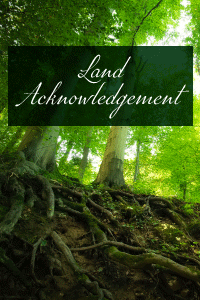A land acknowledgement involves making a statement recognizing the traditional territory of the Indigenous people(s) who called the land home before the arrival of settlers, and in many cases still do call it home.
Providing an acknowledgement at the beginning of an event or meeting gives time for reflection and demonstrates recognition of Indigenous lands, treaties and peoples. It involves thinking about what happened in the past and present, and what changes can be in the future in order to further the reconciliation process. A land acknowledgement is a reflection process in which you build mindfulness and intention into whatever event or gathering you are having.
Land acknowledgements mark a small and important step in the process of reconciliation. By making a territorial acknowledgement you are taking part in an act of reconciliation, honouring the land and Indigenous presence which dates back over 10,000 years.
It is important to note that this is only the beginning and is a call to action. It serves a reminder that we are all accountable to work on actions that move us towards reconciliation.



